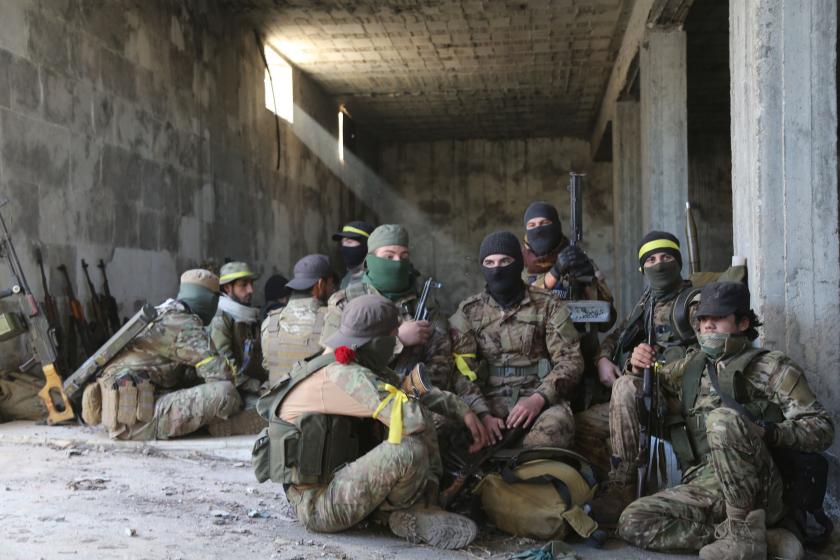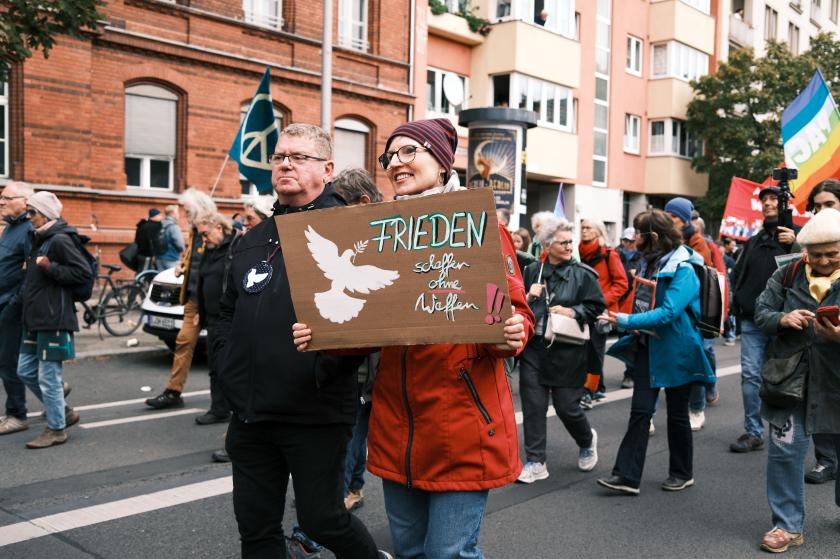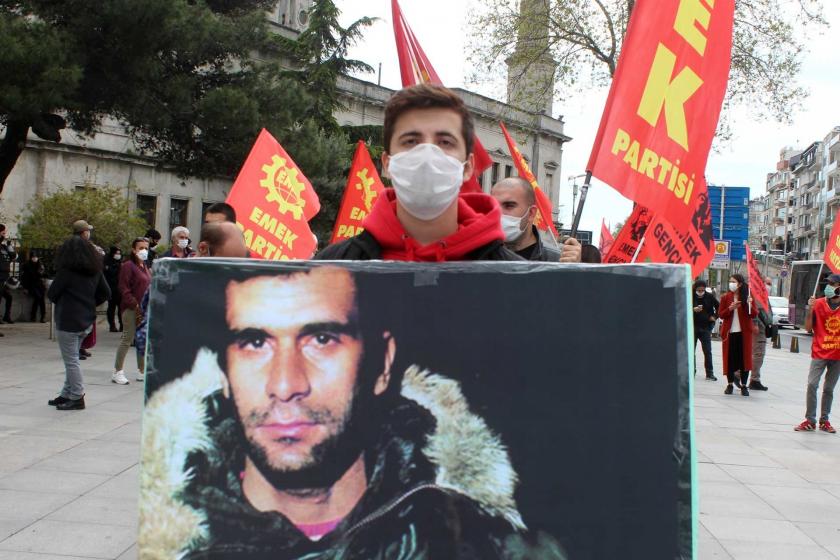Political Scientist Barış Alp Özden: 'Trump is a very functional name for US capital'
Political Scientist Barış Alp Özden: The interests of Turkey’s ruling classes stand in the way of liberation from dependence.
21 January 2019 08:24
Political Scientist Barış Alp Özden: The interests of Turkey’s ruling classes stand in the way of liberation from dependence.

Barış Alp Özden
Serpil İLGÜN
“Will Devastate Turkey's Economy if the Kurds Are Attacked!”
Last week’s political agenda was set by this post made by US President Donald Trump on social media.
As opposed to the abrupt reactions to similar Trump outbursts, the soft approach that AKP management took this time and its ensuing pronouncements of, “We have spoken and reached agreement” stoked up nationalist sentiment on the neo-nationalist front from the CHP to the Good Party.
Just as rhetoric calling for the AKP to tell Trump where to get off has taken the eye off the ball, questions such as what kind of agreement was reached over the safe zone and what the reciprocation will be for the developing of economic relations have lost their pungency. The option of peace has faded even more.
I spoke to Barış Alp Özden about the source of the more frequent tension in US-Turkey relations within the context of the latest version of the US’s carrot and stick policies, the US’s endeavours to restructure the world imperialist capitalist system and the dimensions of the Tump-US established order conflict which the AKP leadership also makes into a reference point.
Barış Alp Özden, who as one of the academics to be dismissed for signing the peace declaration was deprived of his faculty post in Yıldız Technical University’s Political Science and International Relations Department, has authored the books “The 100 True Faces of Neoliberalism” and “The Road Stretching to New Turkey.”
Let’s start with the AKP leadership’s climb-down in countering US President Trump’s tweet, “Will Devastate Turkey's Economy if the Kurds Are Attacked!” with, “We have spoken to Trump and reached agreement.” What could the agreement be that has rapidly dispelled the tension with the US?
We don’t know this. If we had discussed the US-Turkey relationship one week ago you would have asked a different question, and a different one a week later. Because Trump can tweet again a week later and make a 180-degree turn. Zooming out from the here and now and adopting the perspective, “What is Trump trying to do and what is Trump America’s foreign policy?” we can say that the reason Trump was elected was the relative decline in US hegemony’s capacity to manage global capitalism. Trump is the product of this situation, that is both the contradictions it creates within the American ruling classes and state and the contradictions it creates between the American ruling class, between the American bourgeoisie, and working class. The weakening of the US’s global hegemony was something that had been noted prior to Trump, too. What has come the fore in US foreign policy since the time of Bush has not been the international war on terrorism, but essentially the need to redesign the major forces that are capable of opposing its own hegemony. This has been the stuff of internal talk in the US since the pre-Trump period. This has also entered the US’s security strategies. In fact, this was underlined in the new security strategy announced at the start of 2018.
Could you elaborate on “relative decline?” What are the factors that restrict the capacity of the US, still defined in military and political terms as the world’s “superpower,” to manage global capitalism?
Yes, the US, in terms of both economic and military relations as well as the geostrategic ones it enters into, is still the number one superpower. The US military budget was nearly 720 billion dollars last year. This is more than the total of the next seven countries’ military expenditure. It has more than 800 military bases in the world and is at the centre of a massive military alliance like NATO, this being an alliance which stretches up to the Russian border in Europe. Its military-political alliances in Southeast Asia also ensure that it encircles China. For another thing, it is a force that still sets all global trends in ideological and cultural terms, however much it is wobbling and coming into question. So, in this sense, it is still a hegemonic superpower.
At the same time, the world’s globalization processes over the past thirty years and the contradictions caused by the globalization processes have engendered new zones of accumulation and new zones of strength outside the US. A variety of new rivals like, on the one hand, China and, on the other, Russia along with Brazil, Africa, India, Indonesia and Turkey have appeared. China heads this list. This is the crux of the threat China poses for the US. What has brought the world under the US’s entire hegemony until now is its being a power that ensures and guarantees the conditions for capitalism’s reproduction worldwide. The assent for its hegemony that it procured from all other countries and their ruling classes also derived from this power. With this power, the US saw to it that the whole world was designed into zones where capital accumulation would spread. What spurred the US into assuming such a role was the US’s confidence in the competitive strength of its own capital.
But now this confidence is disappearing ...
Yes. The most important event we have witnessed in the last twenty years is the appearance of China as an economic force. It was initially considered to be the workshop of the world with its cheap labour force, but today Chinese companies have reached the stage of being competitive with the US. Huawei has now pushed Apple out as the second largest smartphone manufacturer in the world, for instance. And it will probably develop 5G technology, which will confer a great advantage on China in artificial intelligence and machine-to-machine communications matters, faster than American companies. We see this competition developing in all areas; for example, we see China jostling with the US to export capital in the continents of Africa, Latin America and Asia.
Let’s ask, given Trump’s decision to withdraw from Syria, if this means the US will downgrade its expansionary policies and thus cut its military budget?
No, it doesn’t mean that the US will fully withdraw from either Syria or Afghanistan - on the contrary, we see it constantly increasing its military budget - but Trump is shifting the main thrust of his foreign policy towards this competition between the major powers. Trump looks at things like a merchant and says to the world, “We have acted as the world’s policeman until now and defended you against the bad guys. From now on you have to pay the price for this, too.” If you recall, he did this at the NATO meeting and obtained a promise from all member countries there about increasing military expenditure. Looking at the heart of the matter, this was a success for Trump. He further militarized NATO, that is the alliances of which he is at the centre, and made it into a partner in this fight in the world. He probably wants to assume control in Syria with the number of troops reduced to the minimum but who will he do this with? Turkey says, “Do it with us.” However, officials within the Trump administration and within the US Department of State and the Pentagon say, “No, we’ll make a mistake if we abandon the Kurds to Turkey.” There is a clash along these lines.
What lies at the heart of the clash within the US established order? And will this clash, as is claimed, cost Trump his job?
We can say in very general terms that one group within the US established order thinks the US should continue to be the centre and motive power of the globalization process. The circle Trump represents, conversely, wants to end the globalization process. There is a serious split in the US capitalist class over this issue because, for one thing, Trump’s policies come across in a way that addresses both the fears and daily needs of ordinary American people and this strikes a chord. As such, Trump is a most handy character for the capitalist class in terms of controlling and keeping within certain boundaries the anger at the system of the white working class which globalization has snubbed and left jobless. Hence, in a global economic environment pregnant with fresh crisis, the ruling classes may not abandon Trump for as long as he doesn’t trouble them too much.
What’s your take on Foreign Minister Çavuşoğlu’s words, “This comment is an internal political message” that attribute Trump’s threat to devastate Turkey's economy to an internal clash within the US administration?
This is something they have resorted to out of hopelessness.
On the one hand, the provocative discourse against the US, the conspicuous burning of dollars and smashing of iPads, the stepping up of national-indigenous rhetoric and the presentation of all this as being an antiimperialist stance; then, the rapid return to the discourse of “friend and strategic partner” ... Leaving these rapid reversals to one side, what enables Erdoğan to engage in swagger that creates the impression of being a leader who even challenges the US?
The thing that occasionally enables you to come out with provocative swaggering like “Look here, US” is the space that the relative weakening of US hegemony we discussed at the very beginning has created for you. It does this for all countries. At various periods, they see a game space opening up for them within the nascent geopolitical competitive space. The AKP/Erdoğan take advantage of this, too.
Let’s not forget that, economically, Turkey, despite all that “indigenous-national” rhetoric in AKP circles, is an externally dependent country. And these relations are what you call imperialism. So, being dependent on imperialism to this extent, for one thing you cannot be secessionist to this degree. Also, even if it is for the most part directed at the domestic public and electorate, your ability to make such anti-US utterances as “Look here, US” does not mean you can break away.
Hence, the pretty measured reception on this occasion to the threat, “We’ll devastate your economy,” constituting grounds for war according to some commentators, is attributable in large measure to the one particular reality of going into the local elections under ever graver conditions of crisis as much as the economy’s dependent structure.
And the decision as to what will happen after the US withdraws from Syria remaining untaken. Even if we don’t know the details, Turkey appears to be in negotiations with the US. If you reply in the same pitch to Trump’s high-pitch Tweet you reduce your chances of engaging in such negotiations.
Turkey’s state of dependence on US imperialism has a long and deep-rooted past. So, where has the AKP’s sixteen-year rule taken this?
Turkey, in common with quite a few fellow developing countries, found itself in an exceptionally favourable economic environment in the 2000’s. In an environment in which it was very easy to find funds from abroad, Turkey grew rapidly until 2013, when the effects of the global crisis started to take a toll on it. The Turkish capitalist class also underwent concurrent rapid growth and the Turkish capitalist class entered a new internationalization stage in the AKP period. I am of the view that lying behind all those Middle East and Africa openings in the AKP’s second governing period was the goal of the internationalizing Turkish capitalist class spreading its influence into these areas and acquiring space for capital accumulation in these areas. Turkey thus in this period tried to create an imperial vision, at least in its own region. However, with all these sub-imperialist powers on the one hand pursuing imperial influence policies especially in their own geographic area (for example, the African continent is an important area of influence for South Africa and Latin America for Brazil), on the other hand, their relations of dependence with the imperialist countries at the top echelons of the imperialist chain, to use a classical term, were strengthened. Especially the rapid financialization in the AKP period and Turkey’s enhanced dependence on the international circulation of funds also made it more dependent on imperialist countries. So, the upcoming period is going to be a very difficult period for countries of this kind.
What kind of difficulties are those you speak of and what will be their impact on countries like Turkey?
2019 may be the year the global crisis that started in 2008 goes back on the attack and there is much discussion about this worldwide. In fact, many economists regard this with certainty and are debating where the crisis will spring from. As to whether the origin of its development will be the central capitalist countries or developing capitalist countries like Turkey. Today we speak of a global debt balloon and this applies to every country. Corporate and household debt has reached and indeed exceeded the 2008 level in a fair number of countries in the world. In the US alone, junk corporate debt, i.e. which may not be repaid, is estimated to be 4.3 trillion dollars. Local authority debt in China caused by the extreme appetite for investment is giving serious concern. Many economies of developing countries such as Turkey are undergoing contraction. There is consequently a very high likelihood of entering a period in which economic problems may further enhance geopolitical tension and conflict and the trade wars that have broken out between the US and China may intensify, and at the same time countries may rapidly militarize (there is in any case such a trend in the whole world – arms spending is on the increase).
For sure, such periods of crisis create an opportunity to break away from relations of dependence in objective terms. However, the interests of those governing Turkey and of the ruling class in general stand in the way of Turkey breaking away from these relations.
Along with the measured response by AKP management to Trump’s threat, there was no holding back from the propaganda, “This people will not be intimidated by threats and will say, ‘We’ll go hungry and thirsty but won’t bow our heads,’ either.” According to certain commentators, this climb-down has misfired with the people and this misfiring will find reflection at the ballot box. According to others, though, the measured response to Trump’s threat will not weaken Erdoğan’s hand. How do you see things?
If we look at it with domestic politics in mind, Trump’s Tweet was a Tweet that for one thing strengthened Erdoğan’s hand because Trump has lent weight to Erdoğan’s thesis that attributes the serious fluctuations in the Turkish economy and the rise in the exchange rate to a US attack. We know this isn’t so and this has its origin in the Turkish economy’s structural dependence problems and the Brunson affair just lit the fuse for this, but, as you said, Erdoğan exerts a persuasive power especially over his base. On the other hand, in a period in which the economic crisis and fall in purchasing power day by day increases the burden on working people’s shoulders, we can also imagine that Erdoğan’s measured response to this will, on the contrary, be greeted positively. Hence, as to whether this will be indicative of weakness in the eyes of the people, including the AKP base, there is no great possibility of knowing this, but, if Erdoğan sees such a perception has been created, in couple of days he will come out once more with “Look here, Trump” swaggering. However, this measured attitude may have elicited a sigh of relief among all the downtrodden working people including the AKP base. It may have been greeted with relief along the lines of, “Oh, this time the chief didn’t bawl so things won’t get even worse!”
Translated by Tim Drayton



